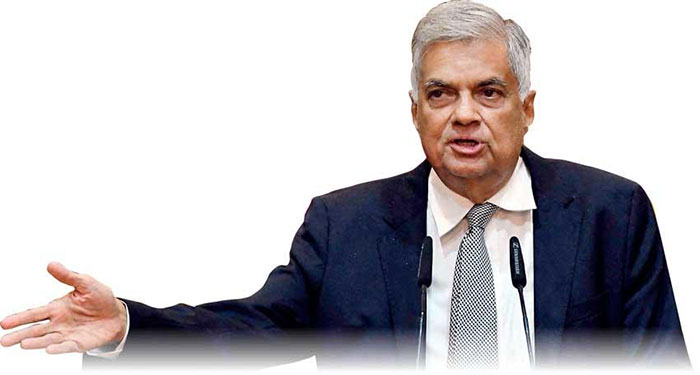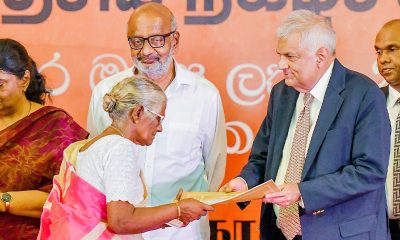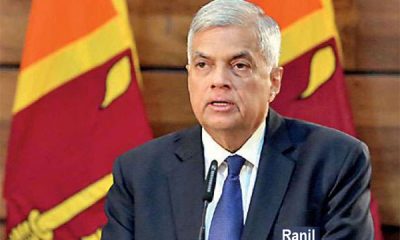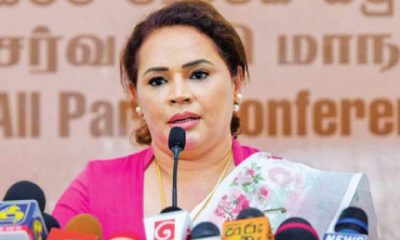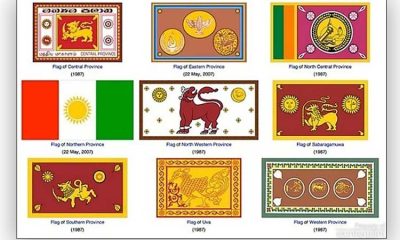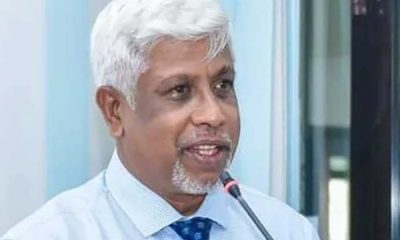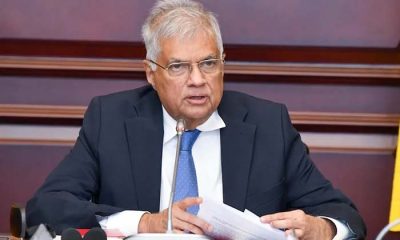Features
Let the Countdown Begin: Parliamentary Elections in March 2024
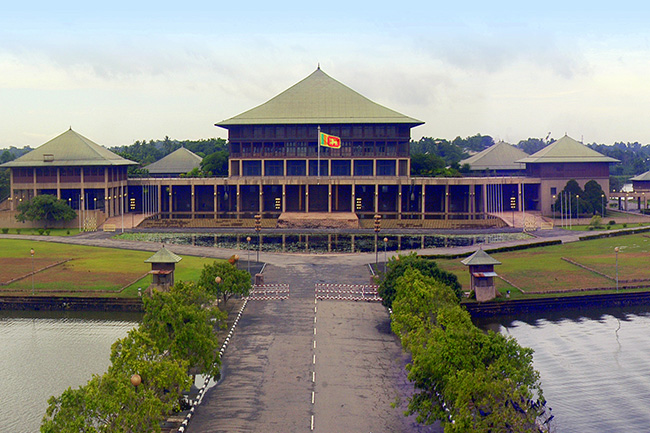
by Rajan Philips
President Wickremesinghe has now made repeated assurances that the presidential and parliamentary elections will be held in 2024. Financial allocations for the two elections were also announced in parliament. Parliamentary elections are expected to come first, apparently in March 2024, according to news reports citing sources close to the President. Let us assume that the sources are correct and start the political countdown before the official call is made early in the new year. It is going to be a 100-day countdown.
A parliamentary election in March will be the first parliamentary election to be held before the presidential election since the twosome began their co-existence in 1982. In that year of disgrace, President Jayewardene conducted and won the country’s first presidential election, calling the election before his first, appointed, term was over, courtesy of the Third Amendment to the Constitution. He then went on to cancel the parliamentary elections that were due that year by staging an undemocratic referendum and doubled the life of an old parliament.
The purpose of advancing the presidential election was to give himself (JRJ) time to manipulate the timing of parliamentary election. This was on top of the arbitrary power that the constitution gave the executive to dissolve parliament any time after one year of its election. This power of dissolution is an unusual, if not unique, constitutional power vested in the executive over the legislature.
So much for the much vaunted separation of powers. The 19th and 20th Amendments have somewhat limited this power, but even what is left of it privileges the executive over the legislature.
President Wickremesinghe will be exercising the presidential power of dissolution to dissolve parliament and call for elections in March 2024, before they are due more than a year later in 2025. In 1982, President Jayewardene did not want to let go of the massive majority he had in the parliament elected in 1977. He kept it going through the referendum chicanery. No one wants this parliament to keep going except the Rajapaksa MPs. The prospect of its dissolution in March is as good as it can get in the circumstances.
Ranil’s Last Hurrah
So far, President Wickremesinghe has been refusing to use the power of dissolution – in order to delay elections. Not anymore, we hope. Now it makes sense for him to dissolve parliament and have parliamentary elections before the presidential election. If the presidential elections were to come first, Ranil Wickremesinghe would likely have faced two unwelcome choices: not to run as a candidate, or to run and lose. That will be the end of his presidency and he would be long gone by the time the next parliamentary elections are held, as they are due, in 2025.
By calling parliamentary elections in March, Mr. Wickremesinghe will have the opportunity and the power to first ‘preside’ over the election in whatever way he can, and then to appoint the Prime Minister and cabinet of Ministers from among the MPs of the newly elected parliament. Neither of which he would probably be able to do if the presidential elections were to go first. In the most likely situation of no single party winning by a clear majority in the next general elections, President Wickremesinghe will be well positioned to call the shots as he pleases, and all within his constitutional powers. But not quite every shot as he might please.
First, the President should not overplay his hand. For unlike in Thailand, it would be counterproductive to try to thwart the results of a popular parliamentary election through clever-by-half executive means. Second, he has a massive trust-deficit with practically every political party in parliament other than an insufficient number of Ministers and MPs who would like to see him continue as President for their own self-serving ends. It will all depend on how the President conducts himself during the parliamentary election.
If he were to take sides or take to machinating between MPs and Parties to forge a new alliance for the election, he had better make sure that such an alliance would be a winning alliance. Otherwise, and that is more likely to be the case, he would be a goner by the time his (really Gota’s) term is up. On the other hand, if he were to exercise enlightened selfishness and stay above the electoral fray, he may have a chance to form a consensus government in the new parliament and take yet another shot at extending his political life. But that will be quite a long shot even for a man who is known for playing the long game.
The revelations that TNA MP Sumanthiran recently made in parliament, about the manner in which Ranil Wickremesinghe broke opposition consensus and broke ranks to become Gotabaya’s crisis Prime Minister, are quite damaging. Add to that, President Wickremesinghe’s recent shenanigans with the Judiciary, the Constitutional Council, and with the appointment of the IGP, have left him thoroughly discredited and untrustworthy. Adding injury to insult, he has appointed the universally lampooned and reviled Deshabandu Tennakoon as the new IGP for a three month term. The upshot of all of this is that no one contesting the next parliamentary election would like to have anything to do with President Wickremesinghe. Other than the irrationally selfish.
Framing the Elections
At the same time, there is no shortage of irrationality or selfishness in Sri Lankan politics, and going by Mr. Wickremesinghe’s long past, he is not going to remain quiet or neutral as President in the next parliamentary election. He may even pull up the abolition card and play it one more time and tack a referendum question on abolition to the vote at the parliamentary election. Whatever Ranil Wickremesinghe may or may not do, the elections should not be about Ranil Wickremesinghe, and he should not be allowed to frame the election.
The elections should be about the possibilities and the potentialities for a Sri Lanka that is finally becoming free from two decades of Rajapaksa-Wickremesinghe political monopoly. The elections will also be about how Sri Lanka is going to be led out of the economic pits by those now vying for power. Then there are carryovers all the way from the twentieth century which have not been addressed but only aggravated during the Rajapaksa yugaya of this century.
The election will be framed by the dialectic of the contenders for power and/or parliamentary seats, and their positions on the manifold issues and problems that are preoccupying the people.
The SJB and the NPP have been calling for elections for almost two years and now they will get their chance to show what they are capable of. The remnants and rumps of the historically governing parties – the UNP, the SLFP and the SLPP will not have any significant identity of their own, but they may not all go into alliances with either the SJB or the NPP. Also, in a parliamentary election there is space for political parties and individuals to enter into multiple alliances.
It will be interesting to see who will be allying with the SJB, and if any of the recognized political parties will be joining the NPP/JVP formation. Any of the Sinhalese parties who are not part of either the SJB or NPP alliances, will not likely be significant players in the election, but may gain specific weights after the election as contributors to a governing majority in return for ministerial portfolios. If it were the first-past-the-post system, the Rajapaksas would probably be wiped off the electoral slate, but some of them could still manage to return because of proportional representation and preferential voting.
The political parties of the Sri Lankan Tamils, Muslims and the Indian Tamils will have their respective, and in some cases overlapping, universes, with their corresponding national overtones. The TNA will likely have to go through a leadership change before the election which may create internal rivalries even as it tries to ward off external rivals especially in the Northern Province. In the East, Sri Lankan plurality will be electorally reproduced with proportionate returns of Tamil, Sinhalese and Muslim MPs.
Political parties of the Indian Tamils, as well as Muslim political parties, have usually joined one or the other of the two main contending alliances. Where they will land this time remains to be seen. Some are with the SJB, while those who are with the current ‘government’ of President Wickremesinghe may have to find new suitors if they are to be relevant after the elections.
Again, it will be interesting to see if the JVP would be able to attract and accommodate any of the minority political parties under its NPP umbrella. It is known that the JVP and especially its leader Anura Kumara Dissanayake have excellent working relationship with many of the Tamil, Muslim and Indian Tamil political leaders, but whether the JVP would be able to draw them into a formal alliance is one of the crucial questions that will be answered during the countdown period.
Even a broadened NPP alliance will not be broad enough if it fails to include one or more of the minority political parties. On the other hand, an NPP alliance that includes minority political parties would send a powerful signal that the JVP/NPP has come of age electorally. Anything less would only mean that the JVP continues to immature in spite of age.
The countdown and the campaign will see shifting focuses around issues along with competing defenders and detractors. The main issues and those that matter are on people’s minds and in their still harrowing living and medical experiences. Then there are issues that preoccupy the pundits and elicit editorial commentaries. How will political parties and alliances respond to them? As well, the formation of political alliances and groupings will be implicated by their positions on the issues and problems facing the country, and will in turn implicate how different issues or privileged or prioritized.
The economic crisis will provide an arresting backdrop to the election campaign. President Wickremesinghe presented his budget on November 13, outlining his purported plan to take Sri Lanka out of the economic crisis. The very next day, the Supreme Court came down with its ruling on the fundamental rights applications against decision makers in the Gotabaya Rajapaksa Administration. The Court apportioned blame for decisions made wrongfully by elected and unelected officials that precipitated Sri Lanka’s worst and its only “man-made” economic crisis.
The voters deserve to know where the SJB, the NPP and everyone else running for election stand on the economy – the current crisis, its perpetrators, and a plausible way out. The upcoming election will also provide a new opportunity for the Catholic Church hierarchy to reiterate the yet unanswered questions about the perpetrators of the 2019 Easter Sunday tragedy. There are shortages of all kinds in Sri Lanka. But there is no shortage of election issues.
Features
The heart-friendly health minister

by Dr Gotabhya Ranasinghe
Senior Consultant Cardiologist
National Hospital Sri Lanka
When we sought a meeting with Hon Dr. Ramesh Pathirana, Minister of Health, he graciously cleared his busy schedule to accommodate us. Renowned for his attentive listening and deep understanding, Minister Pathirana is dedicated to advancing the health sector. His openness and transparency exemplify the qualities of an exemplary politician and minister.
Dr. Palitha Mahipala, the current Health Secretary, demonstrates both commendable enthusiasm and unwavering support. This combination of attributes makes him a highly compatible colleague for the esteemed Minister of Health.
Our discussion centered on a project that has been in the works for the past 30 years, one that no other minister had managed to advance.
Minister Pathirana, however, recognized the project’s significance and its potential to revolutionize care for heart patients.
The project involves the construction of a state-of-the-art facility at the premises of the National Hospital Colombo. The project’s location within the premises of the National Hospital underscores its importance and relevance to the healthcare infrastructure of the nation.
This facility will include a cardiology building and a tertiary care center, equipped with the latest technology to handle and treat all types of heart-related conditions and surgeries.
Securing funding was a major milestone for this initiative. Minister Pathirana successfully obtained approval for a $40 billion loan from the Asian Development Bank. With the funding in place, the foundation stone is scheduled to be laid in September this year, and construction will begin in January 2025.
This project guarantees a consistent and uninterrupted supply of stents and related medications for heart patients. As a result, patients will have timely access to essential medical supplies during their treatment and recovery. By securing these critical resources, the project aims to enhance patient outcomes, minimize treatment delays, and maintain the highest standards of cardiac care.
Upon its fruition, this monumental building will serve as a beacon of hope and healing, symbolizing the unwavering dedication to improving patient outcomes and fostering a healthier society.We anticipate a future marked by significant progress and positive outcomes in Sri Lanka’s cardiovascular treatment landscape within the foreseeable timeframe.
Features
A LOVING TRIBUTE TO JESUIT FR. ALOYSIUS PIERIS ON HIS 90th BIRTHDAY

by Fr. Emmanuel Fernando, OMI
Jesuit Fr. Aloysius Pieris (affectionately called Fr. Aloy) celebrated his 90th birthday on April 9, 2024 and I, as the editor of our Oblate Journal, THE MISSIONARY OBLATE had gone to press by that time. Immediately I decided to publish an article, appreciating the untiring selfless services he continues to offer for inter-Faith dialogue, the renewal of the Catholic Church, his concern for the poor and the suffering Sri Lankan masses and to me, the present writer.
It was in 1988, when I was appointed Director of the Oblate Scholastics at Ampitiya by the then Oblate Provincial Fr. Anselm Silva, that I came to know Fr. Aloy more closely. Knowing well his expertise in matters spiritual, theological, Indological and pastoral, and with the collaborative spirit of my companion-formators, our Oblate Scholastics were sent to Tulana, the Research and Encounter Centre, Kelaniya, of which he is the Founder-Director, for ‘exposure-programmes’ on matters spiritual, biblical, theological and pastoral. Some of these dimensions according to my view and that of my companion-formators, were not available at the National Seminary, Ampitiya.
Ever since that time, our Oblate formators/ accompaniers at the Oblate Scholasticate, Ampitiya , have continued to send our Oblate Scholastics to Tulana Centre for deepening their insights and convictions regarding matters needed to serve the people in today’s context. Fr. Aloy also had tried very enthusiastically with the Oblate team headed by Frs. Oswald Firth and Clement Waidyasekara to begin a Theologate, directed by the Religious Congregations in Sri Lanka, for the contextual formation/ accompaniment of their members. It should very well be a desired goal of the Leaders / Provincials of the Religious Congregations.
Besides being a formator/accompanier at the Oblate Scholasticate, I was entrusted also with the task of editing and publishing our Oblate journal, ‘The Missionary Oblate’. To maintain the quality of the journal I continue to depend on Fr. Aloy for his thought-provoking and stimulating articles on Biblical Spirituality, Biblical Theology and Ecclesiology. I am very grateful to him for his generous assistance. Of late, his writings on renewal of the Church, initiated by Pope St. John XX111 and continued by Pope Francis through the Synodal path, published in our Oblate journal, enable our readers to focus their attention also on the needed renewal in the Catholic Church in Sri Lanka. Fr. Aloy appreciated very much the Synodal path adopted by the Jesuit Pope Francis for the renewal of the Church, rooted very much on prayerful discernment. In my Religious and presbyteral life, Fr.Aloy continues to be my spiritual animator / guide and ongoing formator / acccompanier.
Fr. Aloysius Pieris, BA Hons (Lond), LPh (SHC, India), STL (PFT, Naples), PhD (SLU/VC), ThD (Tilburg), D.Ltt (KU), has been one of the eminent Asian theologians well recognized internationally and one who has lectured and held visiting chairs in many universities both in the West and in the East. Many members of Religious Congregations from Asian countries have benefited from his lectures and guidance in the East Asian Pastoral Institute (EAPI) in Manila, Philippines. He had been a Theologian consulted by the Federation of Asian Bishops’ Conferences for many years. During his professorship at the Gregorian University in Rome, he was called to be a member of a special group of advisers on other religions consulted by Pope Paul VI.
Fr. Aloy is the author of more than 30 books and well over 500 Research Papers. Some of his books and articles have been translated and published in several countries. Among those books, one can find the following: 1) The Genesis of an Asian Theology of Liberation (An Autobiographical Excursus on the Art of Theologising in Asia, 2) An Asian Theology of Liberation, 3) Providential Timeliness of Vatican 11 (a long-overdue halt to a scandalous millennium, 4) Give Vatican 11 a chance, 5) Leadership in the Church, 6) Relishing our faith in working for justice (Themes for study and discussion), 7) A Message meant mainly, not exclusively for Jesuits (Background information necessary for helping Francis renew the Church), 8) Lent in Lanka (Reflections and Resolutions, 9) Love meets wisdom (A Christian Experience of Buddhism, 10) Fire and Water 11) God’s Reign for God’s poor, 12) Our Unhiddden Agenda (How we Jesuits work, pray and form our men). He is also the Editor of two journals, Vagdevi, Journal of Religious Reflection and Dialogue, New Series.
Fr. Aloy has a BA in Pali and Sanskrit from the University of London and a Ph.D in Buddhist Philosophy from the University of Sri Lankan, Vidyodaya Campus. On Nov. 23, 2019, he was awarded the prestigious honorary Doctorate of Literature (D.Litt) by the Chancellor of the University of Kelaniya, the Most Venerable Welamitiyawe Dharmakirthi Sri Kusala Dhamma Thera.
Fr. Aloy continues to be a promoter of Gospel values and virtues. Justice as a constitutive dimension of love and social concern for the downtrodden masses are very much noted in his life and work. He had very much appreciated the commitment of the late Fr. Joseph (Joe) Fernando, the National Director of the Social and Economic Centre (SEDEC) for the poor.
In Sri Lanka, a few religious Congregations – the Good Shepherd Sisters, the Christian Brothers, the Marist Brothers and the Oblates – have invited him to animate their members especially during their Provincial Congresses, Chapters and International Conferences. The mainline Christian Churches also have sought his advice and followed his seminars. I, for one, regret very much, that the Sri Lankan authorities of the Catholic Church –today’s Hierarchy—- have not sought Fr.
Aloy’s expertise for the renewal of the Catholic Church in Sri Lanka and thus have not benefited from the immense store of wisdom and insight that he can offer to our local Church while the Sri Lankan bishops who governed the Catholic church in the immediate aftermath of the Second Vatican Council (Edmund Fernando OMI, Anthony de Saram, Leo Nanayakkara OSB, Frank Marcus Fernando, Paul Perera,) visited him and consulted him on many matters. Among the Tamil Bishops, Bishop Rayappu Joseph was keeping close contact with him and Bishop J. Deogupillai hosted him and his team visiting him after the horrible Black July massacre of Tamils.
Features
A fairy tale, success or debacle

Sri Lanka-Singapore Free Trade Agreement
By Gomi Senadhira
senadhiragomi@gmail.com
“You might tell fairy tales, but the progress of a country cannot be achieved through such narratives. A country cannot be developed by making false promises. The country moved backward because of the electoral promises made by political parties throughout time. We have witnessed that the ultimate result of this is the country becoming bankrupt. Unfortunately, many segments of the population have not come to realize this yet.” – President Ranil Wickremesinghe, 2024 Budget speech
Any Sri Lankan would agree with the above words of President Wickremesinghe on the false promises our politicians and officials make and the fairy tales they narrate which bankrupted this country. So, to understand this, let’s look at one such fairy tale with lots of false promises; Ranil Wickremesinghe’s greatest achievement in the area of international trade and investment promotion during the Yahapalana period, Sri Lanka-Singapore Free Trade Agreement (SLSFTA).
It is appropriate and timely to do it now as Finance Minister Wickremesinghe has just presented to parliament a bill on the National Policy on Economic Transformation which includes the establishment of an Office for International Trade and the Sri Lanka Institute of Economics and International Trade.
Was SLSFTA a “Cleverly negotiated Free Trade Agreement” as stated by the (former) Minister of Development Strategies and International Trade Malik Samarawickrama during the Parliamentary Debate on the SLSFTA in July 2018, or a colossal blunder covered up with lies, false promises, and fairy tales? After SLSFTA was signed there were a number of fairy tales published on this agreement by the Ministry of Development Strategies and International, Institute of Policy Studies, and others.
However, for this article, I would like to limit my comments to the speech by Minister Samarawickrama during the Parliamentary Debate, and the two most important areas in the agreement which were covered up with lies, fairy tales, and false promises, namely: revenue loss for Sri Lanka and Investment from Singapore. On the other important area, “Waste products dumping” I do not want to comment here as I have written extensively on the issue.
1. The revenue loss
During the Parliamentary Debate in July 2018, Minister Samarawickrama stated “…. let me reiterate that this FTA with Singapore has been very cleverly negotiated by us…. The liberalisation programme under this FTA has been carefully designed to have the least impact on domestic industry and revenue collection. We have included all revenue sensitive items in the negative list of items which will not be subject to removal of tariff. Therefore, 97.8% revenue from Customs duty is protected. Our tariff liberalisation will take place over a period of 12-15 years! In fact, the revenue earned through tariffs on goods imported from Singapore last year was Rs. 35 billion.
The revenue loss for over the next 15 years due to the FTA is only Rs. 733 million– which when annualised, on average, is just Rs. 51 million. That is just 0.14% per year! So anyone who claims the Singapore FTA causes revenue loss to the Government cannot do basic arithmetic! Mr. Speaker, in conclusion, I call on my fellow members of this House – don’t mislead the public with baseless criticism that is not grounded in facts. Don’t look at petty politics and use these issues for your own political survival.”
I was surprised to read the minister’s speech because an article published in January 2018 in “The Straits Times“, based on information released by the Singaporean Negotiators stated, “…. With the FTA, tariff savings for Singapore exports are estimated to hit $10 million annually“.
As the annual tariff savings (that is the revenue loss for Sri Lanka) calculated by the Singaporean Negotiators, Singaporean $ 10 million (Sri Lankan rupees 1,200 million in 2018) was way above the rupees’ 733 million revenue loss for 15 years estimated by the Sri Lankan negotiators, it was clear to any observer that one of the parties to the agreement had not done the basic arithmetic!
Six years later, according to a report published by “The Morning” newspaper, speaking at the Committee on Public Finance (COPF) on 7th May 2024, Mr Samarawickrama’s chief trade negotiator K.J. Weerasinghehad had admitted “…. that forecasted revenue loss for the Government of Sri Lanka through the Singapore FTA is Rs. 450 million in 2023 and Rs. 1.3 billion in 2024.”
If these numbers are correct, as tariff liberalisation under the SLSFTA has just started, we will pass Rs 2 billion very soon. Then, the question is how Sri Lanka’s trade negotiators made such a colossal blunder. Didn’t they do their basic arithmetic? If they didn’t know how to do basic arithmetic they should have at least done their basic readings. For example, the headline of the article published in The Straits Times in January 2018 was “Singapore, Sri Lanka sign FTA, annual savings of $10m expected”.
Anyway, as Sri Lanka’s chief negotiator reiterated at the COPF meeting that “…. since 99% of the tariffs in Singapore have zero rates of duty, Sri Lanka has agreed on 80% tariff liberalisation over a period of 15 years while expecting Singapore investments to address the imbalance in trade,” let’s turn towards investment.
Investment from Singapore
In July 2018, speaking during the Parliamentary Debate on the FTA this is what Minister Malik Samarawickrama stated on investment from Singapore, “Already, thanks to this FTA, in just the past two-and-a-half months since the agreement came into effect we have received a proposal from Singapore for investment amounting to $ 14.8 billion in an oil refinery for export of petroleum products. In addition, we have proposals for a steel manufacturing plant for exports ($ 1 billion investment), flour milling plant ($ 50 million), sugar refinery ($ 200 million). This adds up to more than $ 16.05 billion in the pipeline on these projects alone.
And all of these projects will create thousands of more jobs for our people. In principle approval has already been granted by the BOI and the investors are awaiting the release of land the environmental approvals to commence the project.
I request the Opposition and those with vested interests to change their narrow-minded thinking and join us to develop our country. We must always look at what is best for the whole community, not just the few who may oppose. We owe it to our people to courageously take decisions that will change their lives for the better.”
According to the media report I quoted earlier, speaking at the Committee on Public Finance (COPF) Chief Negotiator Weerasinghe has admitted that Sri Lanka was not happy with overall Singapore investments that have come in the past few years in return for the trade liberalisation under the Singapore-Sri Lanka Free Trade Agreement. He has added that between 2021 and 2023 the total investment from Singapore had been around $162 million!
What happened to those projects worth $16 billion negotiated, thanks to the SLSFTA, in just the two-and-a-half months after the agreement came into effect and approved by the BOI? I do not know about the steel manufacturing plant for exports ($ 1 billion investment), flour milling plant ($ 50 million) and sugar refinery ($ 200 million).
However, story of the multibillion-dollar investment in the Petroleum Refinery unfolded in a manner that would qualify it as the best fairy tale with false promises presented by our politicians and the officials, prior to 2019 elections.
Though many Sri Lankans got to know, through the media which repeatedly highlighted a plethora of issues surrounding the project and the questionable credentials of the Singaporean investor, the construction work on the Mirrijiwela Oil Refinery along with the cement factory began on the24th of March 2019 with a bang and Minister Ranil Wickremesinghe and his ministers along with the foreign and local dignitaries laid the foundation stones.
That was few months before the 2019 Presidential elections. Inaugurating the construction work Prime Minister Ranil Wickremesinghe said the projects will create thousands of job opportunities in the area and surrounding districts.
The oil refinery, which was to be built over 200 acres of land, with the capacity to refine 200,000 barrels of crude oil per day, was to generate US$7 billion of exports and create 1,500 direct and 3,000 indirect jobs. The construction of the refinery was to be completed in 44 months. Four years later, in August 2023 the Cabinet of Ministers approved the proposal presented by President Ranil Wickremesinghe to cancel the agreement with the investors of the refinery as the project has not been implemented! Can they explain to the country how much money was wasted to produce that fairy tale?
It is obvious that the President, ministers, and officials had made huge blunders and had deliberately misled the public and the parliament on the revenue loss and potential investment from SLSFTA with fairy tales and false promises.
As the president himself said, a country cannot be developed by making false promises or with fairy tales and these false promises and fairy tales had bankrupted the country. “Unfortunately, many segments of the population have not come to realize this yet”.
(The writer, a specialist and an activist on trade and development issues . )

